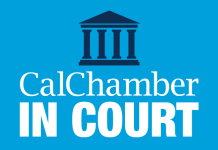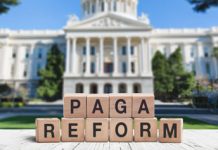The San Francisco Chronicle yesterday announced its opposition to Proposition 53, warning that “the concept could be (a) fiscal disaster spawning lawsuits, delays and higher costs.”
“The problems with initiatives like this one are almost too many to list. Instead of a real seasoning before legislators and state officials, there’s only one author. Clearer language and attempts at compromise are ignored. If it proves disastrous, it can’t be amended or repealed without another public vote,” the newspaper’s Editorial Board writes.
More than 200 groups have joined the bipartisan statewide coalition representing local government, public safety, water, business, labor, agriculture, educators and more opposing Prop 53. The measure will erode local control and add red tape and delays to crucial infrastructure projects, by requiring statewide votes for some local projects.
Under Prop 53, an airport expansion or container port might not be able to tap state revenue bonds without a statewide vote, the Chronicle writes, or Bay Area water agencies would face the same statewide test for certain projects even though the water rates are paid locally.
“It could get even more twisted. To avoid the need for a state vote, a public agency might seek private financing, which costs more than public borrowing. There’s also the fear factor. Instead of taking on a project to improve a port, widen a bridge or build a medical center, public agencies might do nothing to avoid the uncertainty of a statewide vote that might be two years away.”
Other major newspapers opposing Prop 53 include the San Jose Mercury News, The East Bay Times, and the Bakersfield Californian.
Read the full editorial here: http://www.sfchronicle.com/opinion/editorials/article/A-one-man-crusade-isn-t-the-way-to-run-9193825.php
The full editorial appears below:
A One-Man Crusade Isn’t the Way to Run California’s Finances
A Stockton farmer is paying for a crusade that would put state mega-projects that use revenue bonds up for a public vote. The goal is to trim public debt, but the concept could be fiscal disaster spawning lawsuits, delays and higher costs.
The measure, Proposition 53, is being bankrolled by Dean Cortopassi, who made his fortune in farming and food processing. He’s a low-key philanthropist in his hometown who’s dabbled in politics as a fundraiser and donor for both parties.
Now he’s spending $4.5 million to promote a plan that takes dead aim at two targets: the struggling high-speed rail line connecting the Bay Area and Los Angeles, and Gov. Jerry Brown’s twin-tunnel water diversion plan for the delta.
Prop. 53 calls for a state vote on any revenue bond measure larger than $2 billion. The high-speed rail plan may need more public financing, as would the first stages of the delta tunnels. If either taps revenue bonds, which are paid off by users and ratepayers, a statewide vote would be required.
But this approach invites major problems. The state Legislative Analyst’s Office, an independent entity, said the financial impact is “subject to considerable uncertainty.” That’s putting it mildly. A major expansion of an airport or container port might not be able to tap state revenue bonds without going on the California ballot. Several Bay Area water agencies, linked by Sacramento-authorized laws, would face the same statewide test with a $2 billion-plus project even though the water rates are paid locally.
It could get even more twisted. To avoid the need for a state vote, a public agency might seek private financing, which costs more than public borrowing. There’s also the fear factor. Instead of taking on a project to improve a port, widen a bridge or build a medical center, public agencies might do nothing to avoid the uncertainty of a statewide vote that might be two years away.
The problems with initiatives like this one are almost too many to list. Instead of a real seasoning before legislators and state officials, there’s only one author. Clearer language and attempts at compromise are ignored. If it proves disastrous, it can’t be amended or repealed without another public vote.
There’s appeal in the don’t-trust-’em spirit behind the measure. But the risks of unintended consequences are high. Vote “no” on Prop. 53.


